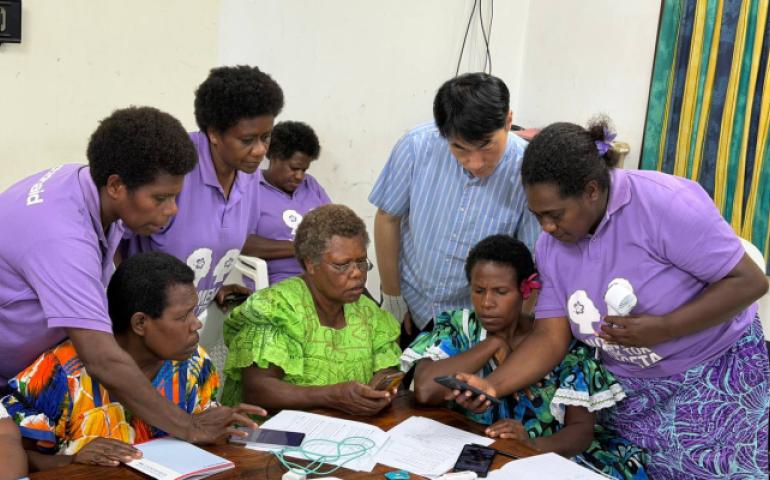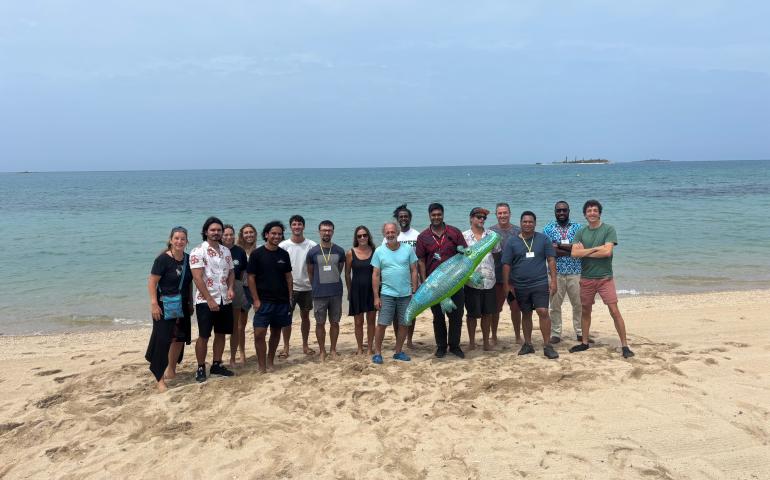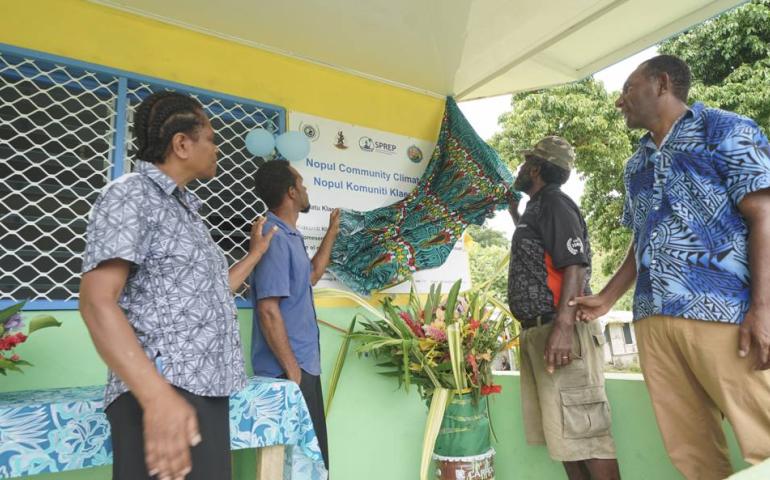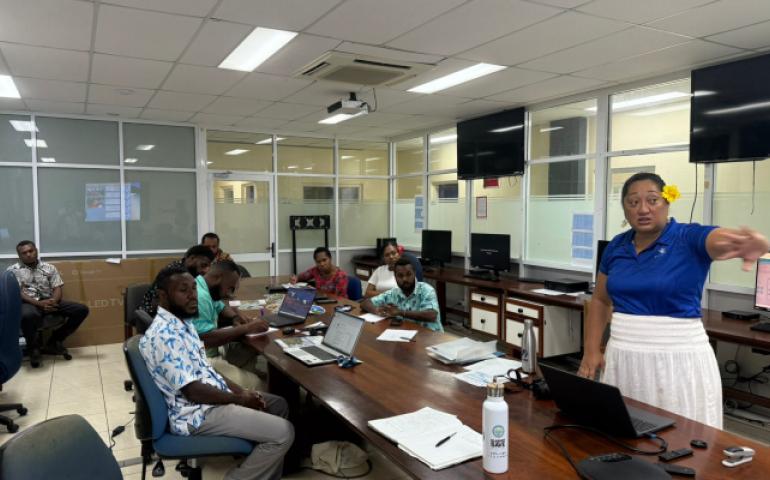
Concept Note and Agenda
Pacific Islands Climate Outlook Forum – 17 (PICOF-17)
22-23 October 2025
Hybrid: Melanesian Hotel, Port Vila and via Zoom
The Pacific Islands Climate Outlook Forum (PICOF) is based on the World Meteorological Organization (WMO) Regional Climate Outlook Forum concept.
The PICOF is co-organised by the Secretariat of the Pacific Regional Environment Programme (SPREP) and the World Meteorological Organization (WMO) Pacific Regional Climate Centre Network (RCC-N), with technical support provided by the Australian Bureau of Meteorology (Bureau), Earth Sciences New Zealand (ESNZ), APEC Climate Centre (APCC), Meteo-France, US National Oceanic and Atmospheric Administration (NOAA), Pacific Community (SPC) and the University of Hawaii as members of the Pacific RCC-N Node for Long-Range Forecasting in partnership with the Pacific Islands Climate Services (PICS) Panel. The latter ensures the needs of National Meteorological and Hydrological Services (NMHSs), and their stakeholders are met. PICOF-17 is co-sponsored by the Australian and New Zealand Aid funded Climate and Ocean Support Program in the Pacific (COSPPac) and SPREP CLIMSA. Ongoing BOM, SPREP and SPC support is largely funded by COSPPac. Additional information on PICOF and the WMO Pacific RCC Network is available via the Pacific Met Desk Website
Overall objective: To discuss and produce objective, user-relevant regional climate and ocean outlook guidance in real time to support Pacific Island Countries and Territories (PICTs), NMHSs produce national climate and oceans climate information for their national stakeholders, with the ultimate aim to reduce climate-related risks and support sustainable development for the coming season in sectors of critical socioeconomic significance.
Objectives:
1) Review the climate and oceanic conditions in the western Pacific region for the period 1 April to 21 October 2025;
2) Present and discuss long-term trends and projections for selected climate and ocean variables;
3) Present monthly and seasonal climate, ocean and tropical cyclone outlooks for the north Pacific region for the season to October 2025;
4) Discuss and review confidence/skill associated with November 2025 to April 2026 outlooks based on the discussions associated with 1-3.
Regional Statement (DOWNLOAD)Expected Outcomes:
a) Improved understanding of climate and ocean monitoring and prediction specifically for the target monitoring and prediction periods.
b) Enhanced understanding of outlook confidence/skill for the period in question;
c) A regional PICOF statement containing climate, ocean and tropical cyclone outlooks for November 2025 to April 2026 which NMHSs can use as guide to develop their national statements;
d) A PICOF-17 report;
e) Content for regional partner and NMHSs climate and ocean bulletins as well as media and social media releases.
Wednesday 22 Oct 2025 (Vanuatu time)
| Time | Agenda Item | Responsible |
|---|---|---|
8.30am-9.00am (6.30am Palau time, 11.30am Honolulu time and 9.30pm UTC) | Registration including morning tea Group photograph | SPREP |
| 9.00am-9.30am | Opening and Setting the Scene
Opening prayer
Opening remarks
| MC – Simon McGree
Philip Malsale
PICS Panel/RCC Management Committee Chair |
| 9.30am-10.00am | Morning tea | |
| 10.00am-10.30pm | Session 1: ENSO Status and Outlook
Including highlights from Global Seasonal Climate Update (GSCU) | ESNZ, BOM, Meteo-France, NOAA, University of Hawaii, APCC, SPREP, SPC |
| 10.30am-12.30pm | Session 2: Looking Back - Review and Evaluation of May to October Climate Outlook
Overview of May to October state of the climate, plus evaluation of the last PICOF outlook
Overview of May to October state of the ocean, plus evaluation of the last PICOF outlook
Overview of the TCs over May to October
Overview of significant weather and ocean events over the last six months | (30 minutes each)
NOAA, University of Hawaii, BOM, SPC, SPREP, ESNZ
NOAA, University of Hawaii, BOM, SPC, SPREP, ESNZ
NOAA, University of Hawaii, BOM, SPC, SPREP, ESNZ
FSM, PNG and Samoa (10 minutes each)
|
| 12.30pm-1.30pm | Lunch
| |
| 1.30pm-3.00pm | Session 3: Looking Forward – Monthly and Seasonal Outlooks for November 2025 to April 2026
PICOF outlook and RCC Node for LRF individual model/MME guidance and skill comparison
PICOF outlook and RCC Node for LRF individual model/MME guidance and skill comparison
PICOF outlook and RCC Node for LRF individual model/MME guidance and skill comparison | (30 minutes each)
ESNZ, BOM, Meteo-France, NOAA, University of Hawaii, APCC, SPREP, SPC
ESNZ, BOM, Meteo-France, NOAA, University of Hawaii, APCC, SPREP, SPC
ESNZ, BOM, Meteo-France, NOAA, University of Hawaii, APCC, SPREP, SPC
|
| 3.00pm-3.15pm | Afternoon tea | |
| 3.15pm-3.45pm | Session 4: Annual-to-Decadal Prediction
| Met Office Hadley Centre |
| 3.45pm-4.15pm | Session 5: Looking Back and Forward Long-Term
| CSIRO, UGCRP, BOM, ESNZ and SPREP |
| 4.15pm-4.30pm | Summary of proceedings | PICS panel chair |
Thursday 23 October (Vanuatu time)
| Time | Agenda Item | Responsible |
|---|---|---|
9.00am-9.15am (7.00am Palau time, 12.00am Honolulu time and 10.00pm UTC) | Objective of the day | Pacific RCC-N (Chair) |
| 9.15am-10.15am | Presentation on development Pacific RCC-N website Questions and Discussion | Pacific RCC-N (Chair) |
| 10.15am-10.45am | Morning tea | |
| 10.45am-11.45pm | Exercise: Evaluation of development website
Participants spend 10 minutes at a table then move to the next one. | Philip, Elise, Terry, Patricia, Nico, Jin-Ho |
| 11.45am-12.15pm | Report back, Next steps and conclusions | |
| 12.15pm-1.15pm | Lunch | |



